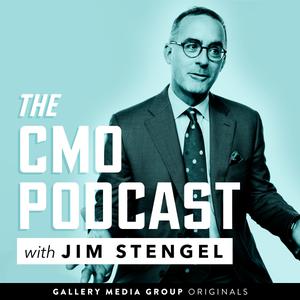
The Modern Retail Podcast
- 33 minutes 8 secondsHow Renais is trying to make ultra-premium gin popular in the U.S.
Renais has lofty ambitions to be the leading global ultra-premium gin brand.
The company, which launched in 2023 in Europe and expanded to the U.S. last year, just raised a fresh round of capital and is working on expanding even further. It was founded by CEO Alex Watson and his sister, actress Emma Watson. Renais Gin isn't cheap -- it retails for around $60 a bottle. But it offers a product that reuses pressed wine grapes from the Watson family's vineyard in France, ultimately making a more sustainable and higher-level gin offering.
According to Alex Watson, who joined this week's Modern Retail Podcast, Renais' growth comes at a fortuitous time. "Martinis are having a moment right now," he said. And while people are drinking less -- especially this month -- they are seeking better options. "People generally are consuming less alcohol these days, but they're trading up," Watson said, "so the volume and the share is all shifting into higher value products."
That gives Renais a clear path to growth. Still, Watson admitted, there are some big competitors in the space. "Some of the headwinds that we face [are] both going up against the likes of the big boys and hundreds-of-years-old brands," he said.
However, he thinks gin may be the best place to introduce a new higher-end product. "Although there's been a lot of innovation in gin -- and there are a lot of gins out there -- there are very few in what we would call the ultra-premium segment of the category," Watson said.
23 January 2025, 5:00 am - 29 minutes 35 secondsRundown: Joann's second bankruptcy, Walgreens looks for new anti-theft solutions & new FDA health proposals
On this week’s Modern Retail Rundown, the staff gives an update on Joann's latest bankruptcy filing, the second in 10 months for the craft retailer. Meanwhile, Walgreens CEO Timothy Wentworth said that locking products in cases is hurting the retailer's sales, and Walgreens is looking for other creative solutions to reduce store theft. Furthermore, days after banning artificial dye Red 3, the FDA is proposing food companies label their products with more transparent health claims.
18 January 2025, 5:00 am - 36 minutes 54 secondsHow THC-infused beverage brand Cann is capitalizing on Dry January
With New Year's resolutions in full force, brands are trying to cash in on Dry January.
Cannabis-infused beverage brand Cann, in fact, usually sees its sales jump every January due to more people teetotaling.
"I just got these numbers earlier today," co-founder and CEO Jake Bullock said on this week's Modern Retail Podcast. "So online -- where we get the data the fastest -- this first week of January is up 75% from where it was this week last year."
That's because the six-year-old company is investing in content related to Dry January -- or what the company likes to call Cannuary. But Cann has also been on a big growth streak. The company is now selling its beverages in liquor stores in about 20 states. A year ago, it was only in around three states with this channel.
Bullock explained that the reason for this growth is changing legislation and more people testing out THC-infused beverages. He also spoke more broadly about the state of cannabis products in the U.S. Cann, he said, has expanded to states "that we would have never imagined we would be selling -- Cann in North Carolina or Tennessee. And not only are we selling there, it's selling really well, and consumers love these products," he said.
Getting more people to try it out is another hurdle. While people who smoke marijuana may be comfortable with trying to drink, others might not be. That's why expanding to liquor stores has been so crucial to Cann's success.
"We've always said we sit at this intersection of sober curiosity and cannabis curiosity," Bullock said. "And that curious customer maybe isn't as comfortable going into a dispensary."
16 January 2025, 12:00 am - 25 minutes 31 secondsRundown: J.C. Penney merges with Sparc, Amazon's new retail ad service & Target doubles down on wellness
On this week's Modern Retail Rundown, the staff begins by discussing the latest retail merger. Struggling department store J.C. Penney is merging with Sparc Group to form a new fashion retail entity called Catalyst Brands. At CES this week, Amazon announced a new program called Amazon Retail Ad Service that allows other retailers to use the company's tech to create their own ad networks. Lastly, this week, Target announced it's releasing 2,000 new products this week geared toward wellness at a lower cost.
11 January 2025, 5:00 am - 37 minutes 48 secondsHow Gregorys Coffee is taking the craft coffee business to scale
Where Starbucks zigs, Gregorys Coffee zags.
That's at least been the unofficial strategy for the cafe chain over the last few years. Gregorys, which initially launched in 2006 in New York but has expanded to more than 50 locations throughout the U.S., sits at the intersection of craft coffee and convenience.
It first launched during the early years of the third-wave coffee boom. Gregory's early days "sort of dovetailed with the third wave of coffee, as they called it -- people focusing more on things like latte art, pour-overs, single origin coffees," said Gregory Zomfotis, the company's founder and CEO. "So, as we are seeing all these new and interesting and innovative things happening in the coffee space, I was able to weave them into the operation almost immediately."
Zamfotis joined this week's Modern Retail Podcast and discussed the growth of his chain and the direction of the coffee world in the coming year.
9 January 2025, 5:00 am - 24 minutes 52 secondsRundown: Return fraud on the rise, Nordstrom going private and Big Lots' lifeline
On this week's Modern Retail Rundown episode, the staff discusses several updates coming off of 2024. First up, a new report from Appriss shows that fraudulent returns totaled $103 billion last year out of a total of $685 billion in retail returns. Nordstrom announced it will go private through a buyout by the Nordstrom family in partnership with Mexican retailer El Puerto de Liverpool. And just days after Big Lots began liquidating its stores, the retailer received a lifeline from investment firm Gordon Brothers Retail Partners to help keep between 200 and 400 of its stores open.
4 January 2025, 5:00 am - 35 minutes 1 secondThe Modern Retail Podcast looks at what's ahead in 2025
On this week’s Modern Retail Podcast, three members of the editorial team dive into what’s to come in 2025. Senior reporter Gabriela Barko, managing editor Anna Hensel and senior reporter Melissa Daniels had a round table discussion about the major issues facing the retail industry.
Hensel, for example, has been keeping a close eye on the M&A landscape.
“My prediction is that we will see more IPOs next year, more M& A in certain areas, like CPG, but that, by and large, smaller, mid-market direct-to-consumer brands won't benefit from it,” Hensel said.
Another major topic for the new year is tariffs -- and how brands and retailers are going to handle them. "For companies that are importing goods, [tariffs are] something that they're now turning over every stone to understand and see how it's going to affect them," said Daniels.
"The brands I've talked to about this, they're doing a lot of math," Daniels said. "Because that suddenly becomes a few different numbers that you have to calculate: How it's going to impact your bottom line. What is the tariff increase? What are the logistics changes? What are the supply chain cost changes? If I am changing my suppliers? I think there are also going to be some people who are just doing a ton of negotiation with their existing suppliers… I think those are going to be a lot of the conversations that people are having right now and into the beginning of Q1."
The future of online commerce was also discussed. For example, TikTok Shop continues to grow -- but its future remains unknown. Meanwhile, other platforms like Temu and Amazon Haul have launched offering cheap goods to customers.
One prediction is that this space is going to continue to grow, even with a potential TikTok shutdown. "No matter what happens to TikTok in the next few months, it sounds like just the overall space the social commerce will end up benefiting," said Barkho, "Maybe some of these other platforms may end up taking market share away from TikTok."
2 January 2025, 5:00 am - 29 minutes 16 secondsAI, customer acquisition and the DTC bust: The Modern Retail Podcast year in review
On this week's Modern Retail Podcast, we're looking back at some of the best episodes from the last year. Host Cale Guthrie Weissman walks us through some of the most interesting conversations he's had with the most exciting retail executives. They include executives from Walmart, Tecovas, Celsius, Violife and more.
Walmart's chief product officer, Jon Alferness, for example, spoke about the retailer's approach to AI. Similarly, buzzy startups also explained their growth playbooks. Olga Osminkina-Jones, chief brand officer of the plant-based cheese brand Violife, spoke about how the company approaches marketing like other big names in the space like Oatly.
Below are the full episodes we feature in this episode:
Violife Chief Brand Officer Olga Osminkina-Jones
26 December 2024, 5:00 am - 27 minutes 30 secondsRundown: U.S. retail sales, Big Lots' liquidation & Vuori's new fundraise
On this week's Modern Retail Rundown: November saw the U.S.'s monthly retail revenue grow by 0.7%, with solid holiday sales expected to come. Meanwhile, Big Lots said it is planning to close all its remaining stores in 2025 after the company failed to strike a sale deal. Lastly, DTC athleisure brand Vuori now has a $5.5 billion valuation coming off of a major fundraising round. The latest update has Wall Street once again predicting the startup to go public sometime soon.
21 December 2024, 5:00 am - 32 minutes 16 secondsHow Puma approaches emerging technology like generative AI
Puma may be a legacy brand, but it's not scared to test out new technologies.
Indeed, if there's a buzzy update, it's likely the company has launched some sort of beta with it. Puma launched a Roblox experience in 2022, it's tested out NFTs and other Web3 programs and has dabbled in augmented reality. Most recently, the sports apparel brand launched a generative AI tool that allows anyone to design a kit for Manchester City.
According to the person leading the charge of these emerging technologies, the hope is to make sure the brand stays on the cutting edge. "A big part of this is just making sure that we are innovating," said Ivan Dashkov, Puma's head of emerging marketing tech. "And, as these technologies become a larger part of everybody's day-to-day life, that we're not straggling behind."
Dashkov joined this week's Modern Retail Podcast and dove into the company's approach to new types of technology, as well as the way it analyzes the success of nascent campaigns.
Dashkov knows a thing or two about testing out new programs. His background was in social media before it was ubiquitous. "I was there for the early days of social at the NBA, and I kind of feel like it's a very similar place now with these new emerging technologies," he said. Now, social media is a dominant force -- and Dashkov believes that's going to happen with some of these programs.
The challenge for him is figuring out where to invest time and resources, as well as sussing out what the next big thing is. Some of that involves keeping an ear to the ground. "A crazy thing that was happening with a lot of the executives at the company [was]: they were asking their kids what they wanted for Christmas, and instead of saying like a toy or video game, they were actually asking for Robux to spend in Roblox," he said. This is what led Puma to test out the Roblox platform.
Similarly, with generative AI, the company has seen people wanting to design their own kits for their beloved teams, but Puma has been unable to make a program at scale. "With AI, you can really scale that," he said. "Like, anybody can kind of go in and use this tool."
19 December 2024, 5:00 am - 23 minutes 7 secondsRundown: FTC sues alcohol distributor, Walgreens' potential PE takeover & Amazon cracks down on paid reviews
On this week's Modern Retail Rundown, the staff discusses a new lawsuit by the Federal Trade Commission of Southern Glazer’s Wine and Spirits, which alleges the alcohol distributor has favored large chains over independent retailers in its pricing practice. Also this week, a new report from the Wall Street Journal claims that Walgreens is in talks with PE firm Sycamore Partners to take the struggling drugstore chain private. Lastly, we discuss a Bloomberg report about Amazon actively cracking down on paid product reviews by reaching out to their creators on social media.
14 December 2024, 5:00 am - More Episodes? Get the App
Your feedback is valuable to us. Should you encounter any bugs, glitches, lack of functionality or other problems, please email us on [email protected] or join Moon.FM Telegram Group where you can talk directly to the dev team who are happy to answer any queries.
 The Glossy Podcast
The Glossy Podcast
 How I Built This with Guy Raz
How I Built This with Guy Raz
 Wisdom From The Top with Guy Raz
Wisdom From The Top with Guy Raz
 The CMO Podcast
The CMO Podcast
 Limited Supply
Limited Supply
 Shopify Masters | The ecommerce business and marketing podcast for ambitious entrepreneurs
Shopify Masters | The ecommerce business and marketing podcast for ambitious entrepreneurs